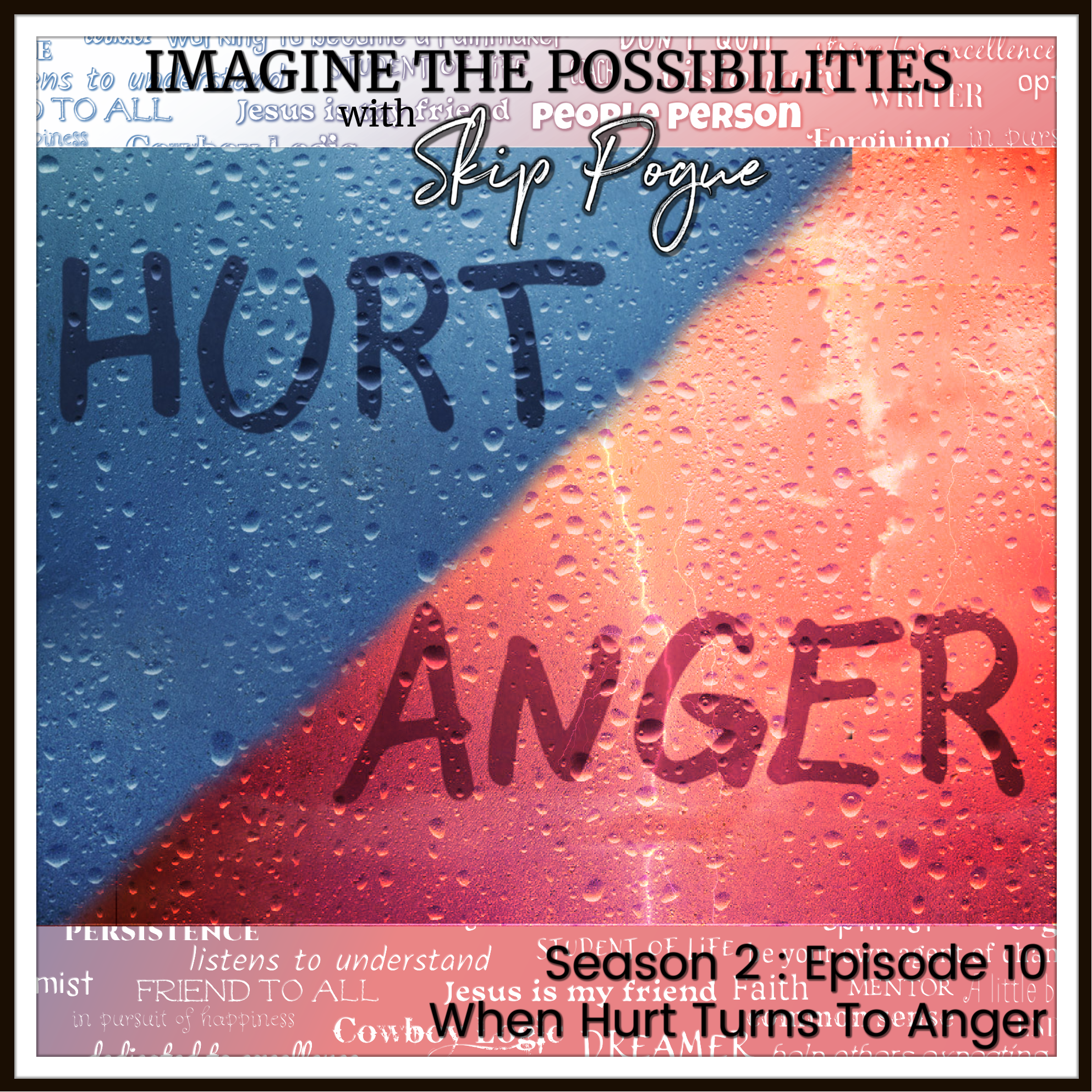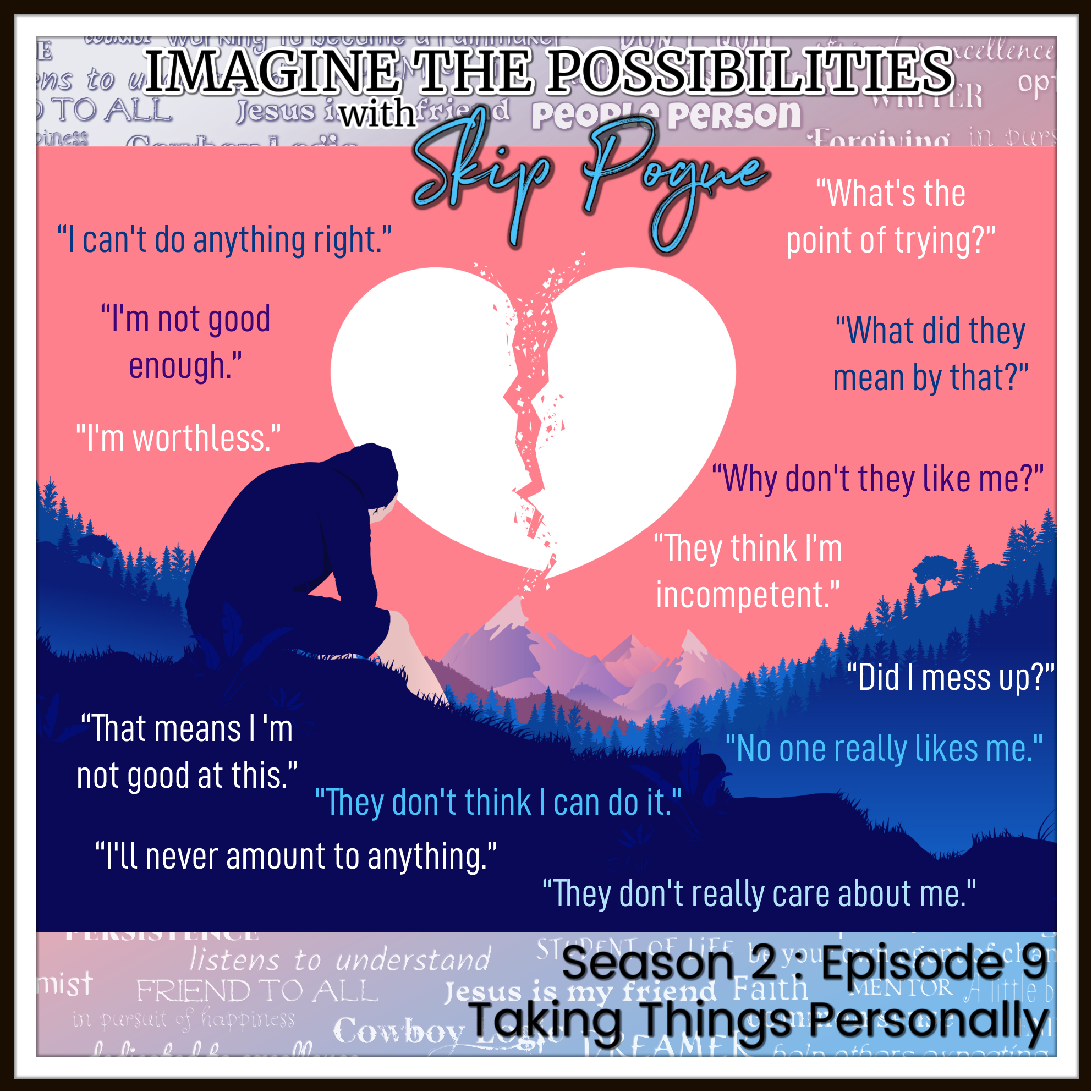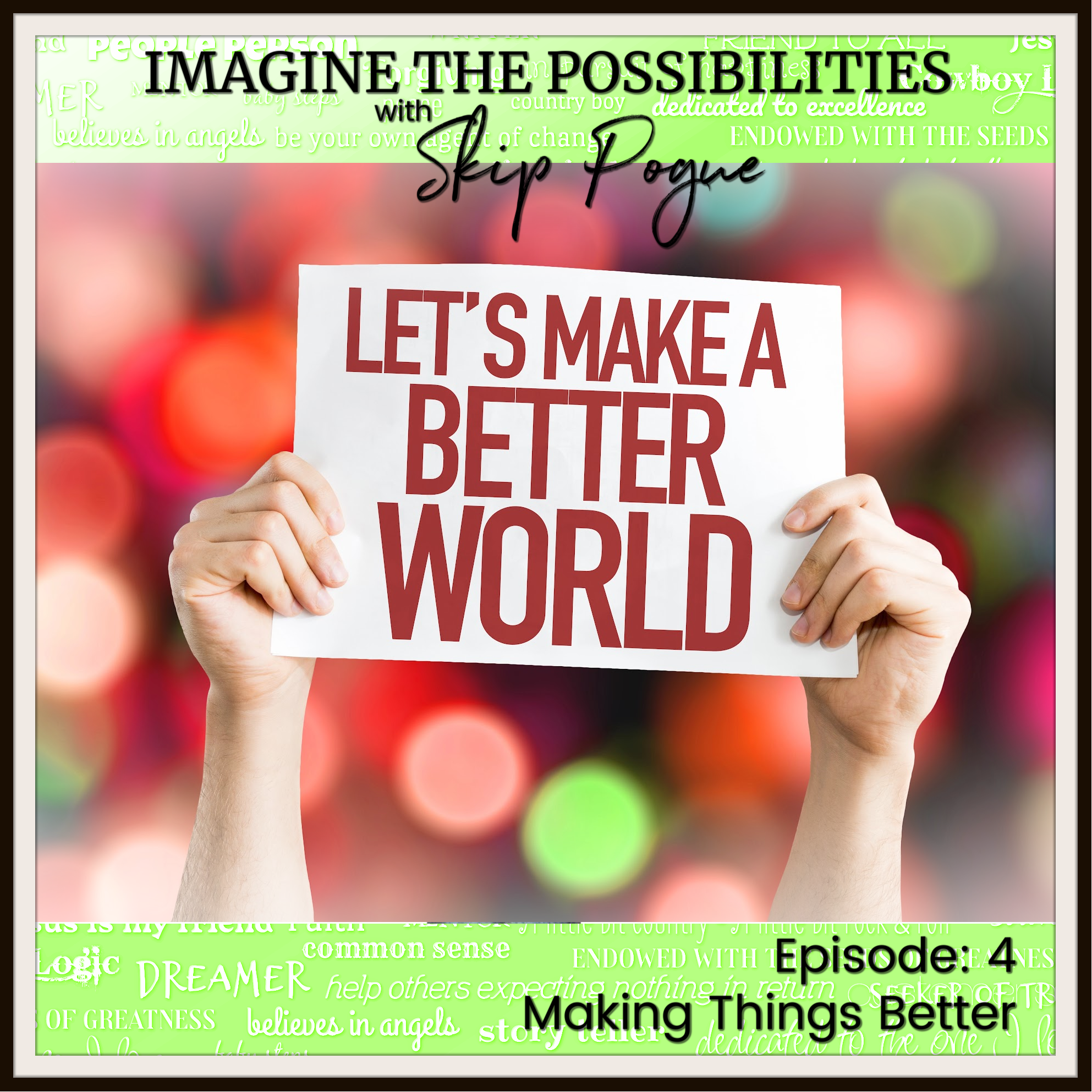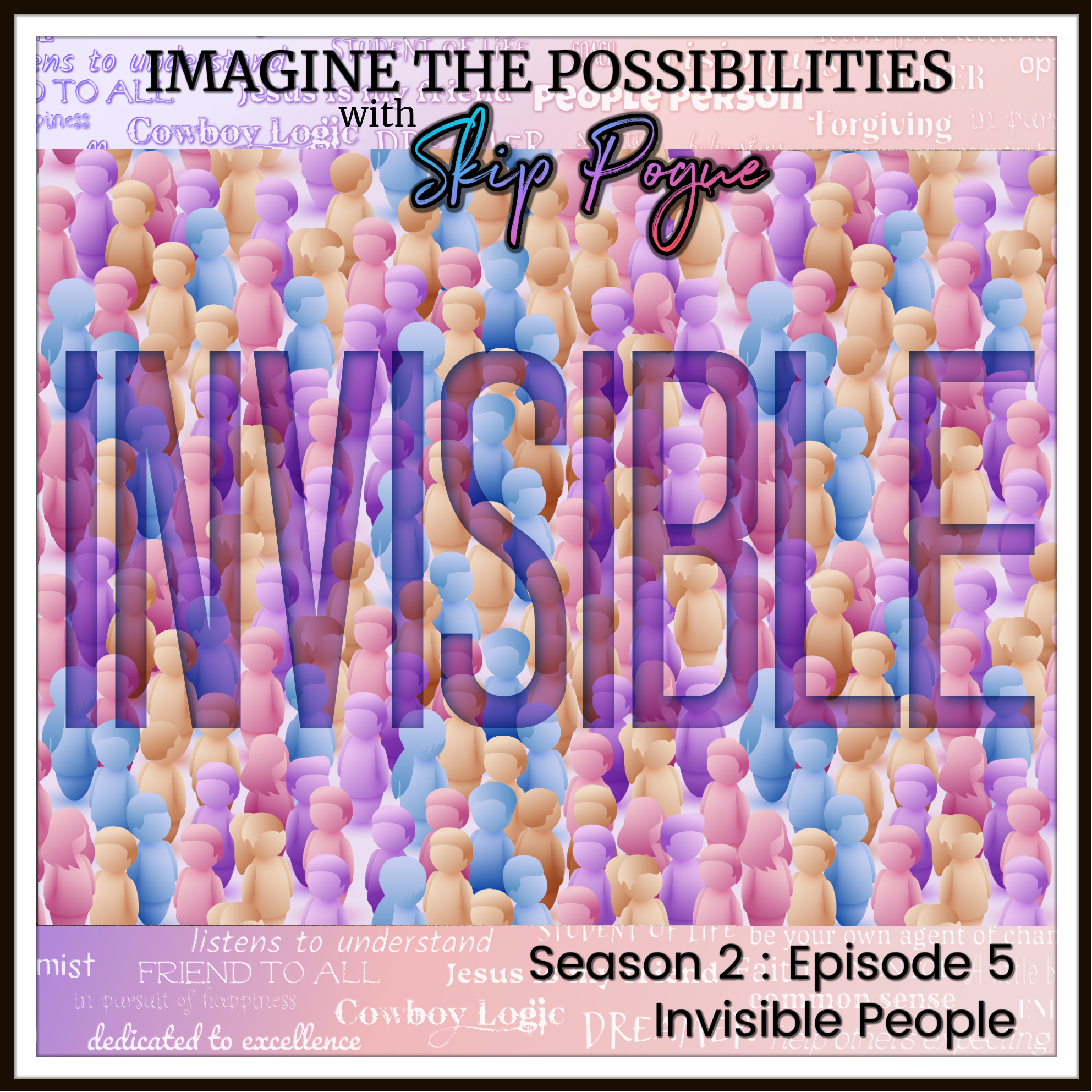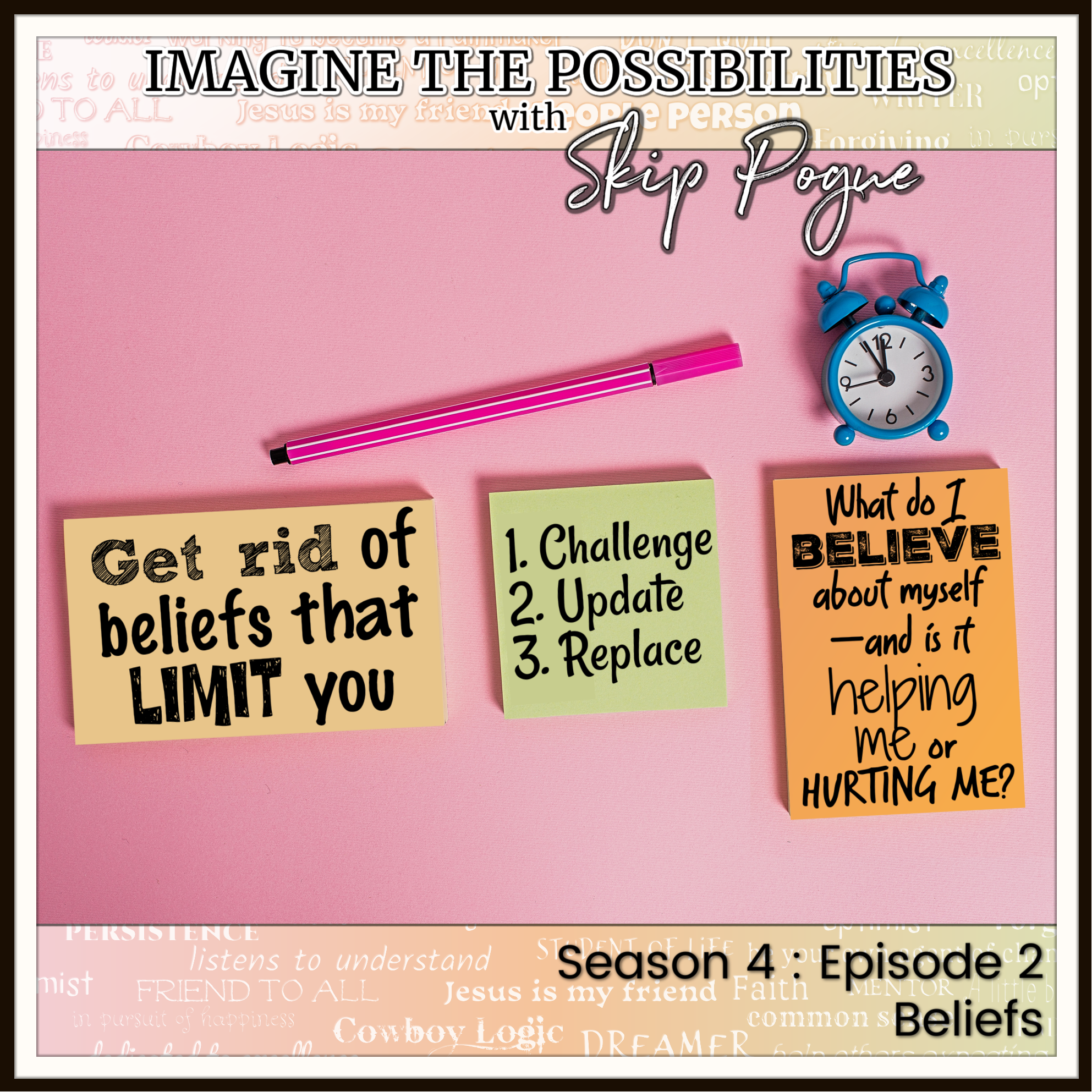What happens after we take something personally? For many of us, that hurt doesn’t stay hurt—it grows. It festers. It turns into anger. In this follow-up to Episode 9, we take a closer look at what happens when emotional pain shifts into emotional reaction. We talk about how the brain responds to hurt, how we can pause before we spiral, and why grace matters more than ever. If you’ve ever spoken out of pain, reacted with frustration, or regretted how things escalated—this episode is for you. Let’s find clarity, healing, and peace—before anger takes over.
View Full Transcript
Episode Transcript
[00:00:13] Hello, and welcome to Imagine the Possibilities. My name is Skip Pogue. This episode is titled When Hurt Turns to Anger.
[00:00:22] If you recall the last episode, we talked about taking things personally and how those moments can really get under our skin.
[00:00:31] But what happens next?
[00:00:33] What happens after we take something personally and it really hurts us?
[00:00:38] For a lot of us, including me, that hurt doesn't just stay hurt.
[00:00:43] It grows, it festers. It changes.
[00:00:47] Before we know it, we're angry.
[00:00:51] This episode is about understanding how that shift happens and how we can catch ourselves before we get too far down that road.
[00:01:02] The emotional hurt that we're experiencing can be caused by being misunderstood, feeling dismissed, feeling judged, feeling betrayed or excluded, or a myriad of other things. But it's always something that hurts us.
[00:01:24] Our brain reacts to emotional hurt as if it were a threat.
[00:01:29] When that happens, it triggers the fight or flight response.
[00:01:34] The amygdala, the part of our brain that handles emotions, takes over.
[00:01:40] And it does that oftentimes before the rational mind catches up.
[00:01:46] For many of us, that response leads to our getting into the fight mode. We become defensive, we use sharp and hurtful words, and we get angry.
[00:02:01] Now, it's not that we always want to be angry, it's just that our brain thinks it's protecting us from emotional danger.
[00:02:11] But here's what I've learned. If I can pause just long enough to find some clarity, I. I can stop the spiral before it starts.
[00:02:22] Clarity helps us step outside the emotional fog that we're experiencing and ask the questions, what really just happened? Or is there another way to see this?
[00:02:33] Or is there a better way to see this?
[00:02:37] That moment of clarity can be the difference between having a calm conversation or a full blown argument.
[00:02:47] Now, doing this doesn't erase the pain we're feeling, but it keeps it from turning into something bigger than it needs to be.
[00:02:58] One of the things that makes hurt even harder to deal with is when we assume someone meant to hurt us, that they did what they did intentionally.
[00:03:11] What if they didn't?
[00:03:13] What if they were just trying to offer some insight, maybe even trying to help, but the way it came out hit us as the wrong way.
[00:03:23] Now, it doesn't make our feelings any less valid.
[00:03:27] But recognizing that their intention may have been good or at least neutral, can help us respond with more clarity and be less defensive.
[00:03:40] If we can pause to consider intent again, we might stop the spiral before it starts.
[00:03:49] When hurt turns to anger, why does it do that? Well, anger is a secondary emotion.
[00:03:56] It always shows up after something deeper, like pain or fear.
[00:04:03] For some reason, Anger gives us a sense of control.
[00:04:08] It gives us that sense of control even when we're emotionally spinning out of control.
[00:04:13] So we got to be cautious.
[00:04:16] For me, when I get hurt, I'm not one of these people that shuts down. I speak up. The issue is that sometimes I say things that I haven't really thought through.
[00:04:27] There's been times I've tried to transfer the hurt back unto the person who hurt me, like I'm trying to force them to take responsibility for how I feel.
[00:04:40] Sometimes anger can feel like a shield, but the problem is, it often creates more pain than protection.
[00:04:49] The hard part is, the more we react in anger, the more distance we create between us and the other person.
[00:04:59] And this is especially true if we're in an argument or we're angry at some person we really care about.
[00:05:11] Not all anger is explosive. Now, sometimes it does go from 0 to 100 miles an hour in 1.2 nanoseconds, and we're ready to rock and roll.
[00:05:20] But most times it builds quietly, and it does that as we replay the hurt in our minds over and over.
[00:05:32] For me, I tend to analyze things, and I tend to probably do that too much. Too many times I analyze what was said, how it was said, and how I should have responded.
[00:05:46] The thing is, by the time I've worked through that in my head, I wonder why I even got upset.
[00:05:52] But in the moment, I felt justified.
[00:05:58] If we don't process the hurt we're feeling, the emotional cost goes higher and higher, and it can cloud everything. It can cloud how we see people, how we see ourselves, and how we're going to react next.
[00:06:16] The danger is not in just what we say, but in what we carry with us.
[00:06:23] In order to process it, we may need a safe space.
[00:06:28] I can suggest several things. One is remove yourself from the whole situation.
[00:06:34] Go for a drive and talk about what happened.
[00:06:38] And talk out loud. Don't talk in your head. Talk out loud. Listen to the words and try to figure out why you reacted the way you did. And try to figure out the intention. Was there intent on the other person, or were they really seriously trying to help you?
[00:06:56] Another way to deal with it is to sit quietly and journal your thoughts. Now, I journal, and if you do and you want to do it that way, it's great. Write down how the situation started, what was said, what you said, what what was said. Again, the response, how you felt, how you believe they felt, what you think the intentions were. Write it all down.
[00:07:20] And once you've got it all written down, you got it all on paper. Close your journal, wait about 15 or 20 minutes, open your journal back up and start reading it and see if you still agree with the things you wrote down, that you still agree with the way you felt and the way things turned out and go from there.
[00:07:48] A way I found that works really well is use the voice recorder on your phone, record it, Record what was said, what you said, what happened, how you got angry, what caused you to get angry, and all the same things you did in a journal, except use your voice and when you're done, do the same thing. Turn your voice recorder off, lay your phone down, walk away, wait 15 minutes or so, come back, open it back up and listen to it, and see if you still feel the same way.
[00:08:22] Another way to deal with it is to pray. And I do that because I have a very good relationship, a personal relationship with Jesus Christ. I've told everybody this before, but I. I don't pray. Like I always say, it's not normal the way I pray. I have a conversation with Jesus.
[00:08:38] I explain things, and I truly believe he talks back. He answers me back, and we have this conversation. Now when I sit down with Jesus and have this conversation about how I reacted in this particular situation and how I got angry, if I'm wrong, He does not mince any words, letting me know that what I did was not only wrong, but I failed in a lot of situations that I should have done right in the whole process. So I get the message. How's that?
[00:09:14] And so if you believe in God or a higher power, pray.
[00:09:20] You can meditate just however you normally meditate, just meditate on it. Open your mind up, think about it, Figure out what. Be singularly focused. That's a good word, singularly focused on this issue, or just reflect on the intentionality of it.
[00:09:41] For me personally, occasionally I'll just go out and get in my car, close the door. I don't start the car. I don't drive the car. I just sit out there and talk through it, talk out loud. And at some point in time, I get calmed down and everything's okay. I understand what happened, why it happened.
[00:10:02] We don't always need someone to fix this. Sometimes we really just need the space to feel it.
[00:10:10] Processing emotions privately can help us release them before they even do damage, which is a good thing when it comes to releasing anger.
[00:10:21] I want to talk a bit about grace.
[00:10:24] Grace for ourselves and for others.
[00:10:27] I believe that grace lies between what's being said and how we respond.
[00:10:34] It sits in that space where we can choose a better outcome now. Releasing anger isn't about pretending it doesn't exist.
[00:10:44] It's about acknowledging it, understanding it, and letting go of its grip on us.
[00:10:51] Over the years, I've learned that I don't always need the other person to fix it.
[00:10:56] I need to decide how I carry it. Or better yet, I need to decide how I let it go.
[00:11:04] Grace gives me and us that power.
[00:11:08] Forgiveness. Grace frees us from staying stuck.
[00:11:12] That's the breakthrough. That's what grace does.
[00:11:16] Forgiveness doesn't excuse the harm, but again, it frees us from being stuck.
[00:11:22] Here's something to really think about.
[00:11:25] Sometimes the most healing moment comes not when someone apologizes, but when we release the need for them to do that.
[00:11:36] This whole thing is really an emotional journey. We have to understand that hurt is part of life. So is anger. But what we do with those emotions is what defines our peace.
[00:11:49] It's what defines our relationships, and it's what defines how we grow.
[00:11:56] I'd like you to take a moment and think about a time when you felt hurt. Did it turn into anger? Did it build up? What. What role did clarity play in it? What role did intention play in it? If any.
[00:12:09] Just think about it and how it affected you and what you might change. Now that we've discussed this some, what you might change to react differently the next time it happens.
[00:12:22] Here's a thought. Moving forward, when you feel that you might be getting angry, think about the why.
[00:12:30] Think about pausing to catch your breath, so to speak.
[00:12:34] Focus on the things we discussed here to diffuse the situation.
[00:12:40] Look at grace as the solution to the issue.
[00:12:44] It's okay to feel it, but it's also okay to slow down, step back, and handle things differently the next time.
[00:12:52] Here's my mission in all this.
[00:12:55] I want to help you. I want to help you get better at life.
[00:13:00] I want to make it easier for you when you have one of these problems. Give you some tools you can use to hopefully resolve them before they become. Before you become angry, before they get blown out of proportion.
[00:13:13] I hope that maybe you picked up a nugget or two that'll help you in your personal, professional, or spiritual life. That'll help you grow.
[00:13:21] Maybe found an idea that will make your life simpler or more fulfilling.
[00:13:26] That's really what I want to accomplish by doing these podcasts. I want to give you ideas to help you moving forward. And that's all.
[00:13:34] Anyway, thanks for listening.
[00:13:38] I really appreciate you taking time out of your busy schedule to listen to me and my podcast.
[00:13:45] If you've got comments or suggestions about dropping me a line.
[00:13:51] Email address is imaginethepossibilities lifegmail.com Looking forward to hearing from you.
[00:13:59] As always, I wish you much success.
[00:14:03] Remember that your future belongs to you.
[00:14:06] Stay humble, be kind, love unconditionally and laugh often.
[00:14:12] I hope that you have a super day and I pray that God blesses you in a super way.
[00:14:18] Thanks again and God bless.
